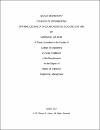Optimal Design of a Solar Assisted Cooling System
Abstract
Rapid development around the globe is fairly associated with huge consumption of energy; regardless of the continuous attempts of exploiting renewable energy resources, further investigations in renewable energy involvement in comfort cooling appears to be interesting. District Cooling Systems (DCS) are chilled water based systems operate to provide comfort cooling. DCS consists of chilled water plant, chilled water distribution network and energy transfer station(s), where Thermal Energy Storage system (TES) might be included alongside with DCS as auxiliary components(s). Although typical DCS are fully dependent on fossil fuel as source of energy in their operation, providing comfort cooling is considered as a necessity in some regions of the globe. Such circumstances highlight the imperative of examining other sources of energy, such as renewable energy. One think there is no better alternative of energy resource problem than solar energy, specifically the science of converting heat into cool. Researches in the field of Solar Assisted Cooling systems (SAC) designated typical components of solar assisted cooling system to be solar collector(s) and absorption chiller(s); where TES and water boiler utilized as auxiliary components. In comparison to conventional cooling systems, SAC systems have the advantages of renewable energy utilization beside the correlation of high availability of solar energy with the high demand of comfort cooling. Yet, their relatively high investment costs introduces barriers toward their implementation; thus, the contribution of this research is realized in mathematically modeling SAC system and obtaining the optimal design of such system with the aim of minimizing the investment and operational costs. The problem is modeled as Mixed Integer Linear Problem (MILP) and the optimization of the model is implemented using CPLEX optimizer. The optimized solution specify the optimal area of the solar collector, size of absorption chiller, size and existence of chilled and hot water storage tanks, and the auxiliary boiler.
DOI/handle
http://hdl.handle.net/10576/5040Collections
- Engineering Management [140 items ]


